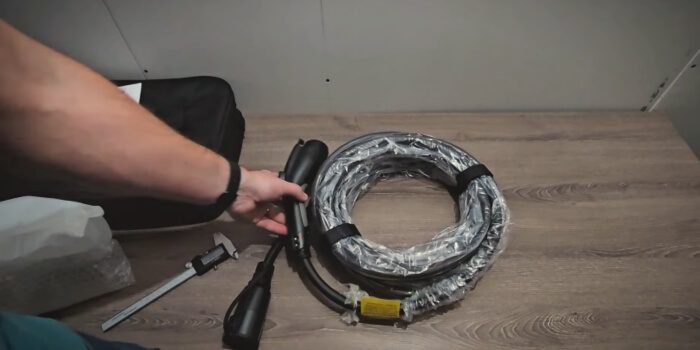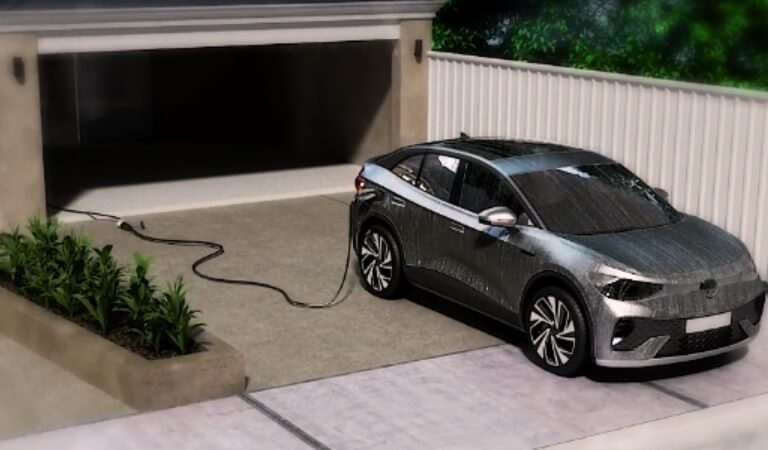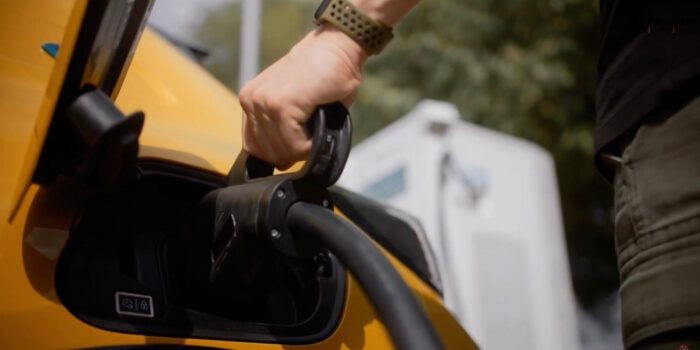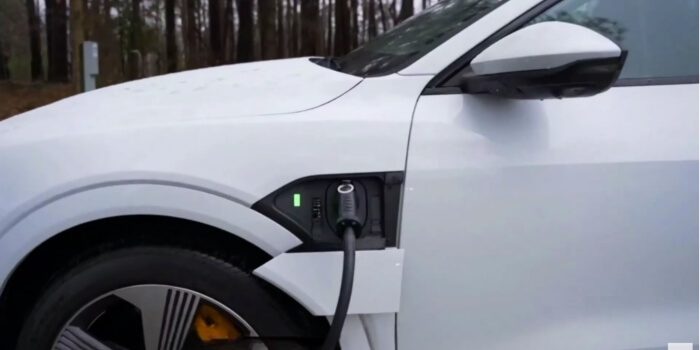Electric vehicle (EV) charging has become essential for the people who own it, ensuring your ride is always ready for the next adventure. But we often hear, “Can I charge my EV with an extension cord?”
Unfortunately, no. It’s not recommended due to significant safety concerns. Instead, it’s best to stick to a dedicated EV charging station for reliable and safe charging.
If you’re wondering about the ins and outs of this topic, why it’s looked down upon, and what alternatives you have, you’re in the right place. Stick around as we dive deeper into this electrifying subject!
What is an Extension Cord?
An extension cord is a handy tool that powers devices when they’re too far from an outlet. It’s a long, flexible electrical cable with a plug at one end and one or more sockets at the other. They come in various lengths and thicknesses, tailored to different needs.

However, not all extension cords are created equal; they’re rated based on their electrical load. This is crucial to ensure safety and prevent hazards like overheating. Before using one, always check its rating to match your device’s power needs.
Can I Charge My EV With an Extension Cord?
No, charging your electric vehicle (EV) with an extension cord is not recommended. While it might seem like a quick fix, there are more safe and effective solutions. There are several important factors to consider before you plug in, which could affect both your safety and your car’s efficiency.

Safety Concerns
Using an extension cord can lead to overheating, especially if it’s not designed for high loads. This risk increases with cords that are thin or very long. Overheating can damage your vehicle’s battery and the electrical system of your home. Always prioritize safety and avoid potential hazards by not using extension cords for EV charging.
Cord Specifications
Not all cords can handle the same amount of current. Your EV requires a specific amperage that most household cords can’t provide. Using an adequate cord can result in efficient charging or damage. It’s essential to understand the specifications of your EV and the cords you use.
Charging Efficiency
Charging with an extension cord may reduce the charging efficiency of your EV. This can lead to longer charging times and reduced range. Inefficient charging also puts additional strain on your vehicle’s battery. Opt for a dedicated EV charging station to ensure efficient and effective charging.
Manufacturer Recommendations
Vehicle manufacturers often advise against using extension cords for charging. They recommend using dedicated EV charging stations to ensure safety and efficiency. Following these guidelines helps maintain your vehicle’s warranty and longevity. Always refer to your vehicle’s manual for the best charging practices.
Electrical System Compatibility
Your home’s electrical system must be compatible with your EV’s charging requirements. Extension cords might not match the needed voltage and amperage, leading to potential risks.
Upgrading your home’s electrical setup can provide a safer, more efficient charging experience. Always consult a professional electrician to ensure your system meets the necessary standards.
Outdoor Conditions
Charging outdoors with an extension cord introduces additional hazards, such as exposure to rain or extreme temperatures. Moisture can cause short circuits, while high heat can degrade the cord’s integrity.
If outdoor charging is a must, invest in weatherproof charging solutions designed for outdoor use. This ensures your charging process remains safe, regardless of the weather conditions.
Long-Term Effects
Frequent use of inadequate charging methods can shorten the lifespan of your EV’s battery. It’s crucial to use proper charging stations to maintain battery health and overall vehicle performance.
Over time, the right charging practice saves money and prevents frequent battery replacements. Always aim for the most efficient and safest charging method to protect your investment in the long run.
Legal and Insurance Implications
Using an extension cord against manufacturer advice may void warranties or insurance policies. In case of damage or accidents caused by improper charging, you might be liable.
Ensure your charging practices are in line with regulations and insurance requirements. Proper charging methods keep you covered and avoid potential legal issues.
Community and Residential Regulations
Living in an apartment or a community with shared spaces can have specific rules regarding EV charging. Using extension cords could violate these regulations or pose risks to others.
Always check with your residential management or homeowners association for approved charging methods. Adhering to these rules ensures safety and harmony within the community.
Future-Proofing Your Charging Setup
As EV technology advances, your charging needs may evolve. Investing in a proper EV charging station is a forward-thinking choice.
This not only caters to your current vehicle’s needs but also accommodates future EVs. A dedicated charging station is a wise investment for any EV owner, ensuring compatibility and efficiency for years to come.
Environmental Considerations
The goal of driving an EV is often to reduce environmental impact. Using an extension cord can lead to inefficient charging and increased energy waste.
By charging your EV properly, you contribute to energy conservation and environmental protection. Opting for green charging options aligns with the eco-friendly ethos of electric vehicle ownership.
Convenience and Peace of Mind
While setting up a dedicated charging station might seem like a hassle, it offers unparalleled convenience and peace of mind. Knowing that your EV is charging safely and efficiently allows for a better overall experience.
The convenience of having a ready-to-go vehicle without safety concerns is worth the initial setup effort. Embrace the full benefits of EV ownership by investing in proper charging infrastructure.
Proper EV Charging Requirements- What are They?
Correctly charging an electric vehicle (EV) is crucial for safety, efficiency, and longevity. Proper charging ensures your EV runs smoothly and maintains its battery health. Here’s what you need to know about the right way to charge your EV:

- Appropriate Charging Station: A dedicated EV charging station is essential. It should match your vehicle’s specifications for optimal charging.
- Correct Electrical Output: Your home’s electrical system must support the EV charger’s requirements. Consult a professional to ensure compatibility and safety.
- Regular Maintenance: Inspect your charging cable and station regularly for wear or damage. Preventative maintenance avoids hazards and ensures efficient charging.
- Adherence to Manufacturer’s Instructions: Follow your vehicle’s manual for charging guidelines. This maintains battery health and ensures warranty validity.
- Weather Considerations: If charging outdoors, use equipment rated for external conditions. Protect your charging setup from extreme weather to avoid damage.
- Battery Care: Avoid charging your battery 100% daily if not needed. Regular, more minor charges can extend your battery’s lifespan.
- Ventilation: Ensure your charging area is well-ventilated. Proper airflow prevents overheating and increases safety.
- Smart Charging Features: Utilize innovative charging options if available. Schedule charging during off-peak hours to reduce costs and grid strain.
Proper EV charging is more than just plugging in your vehicle; it’s about ensuring safety, maximizing efficiency, and protecting your investment. Following these guidelines allows you to enjoy a seamless and worry-free EV ownership experience. Remember, taking the time to charge today correctly can lead to a smoother drive tomorrow.
Pros and Cons of Charging Your EV with Extension Cord
A charge of an electric vehicle (EV) requires thought and care, especially when it comes to unconventional methods like using an extension cord. While it might seem like a convenient solution, it’s worthwhile to weigh the benefits against the risks. Here’s what the pros and cons are.
Pros
- Immediate Solution: Handy for emergency situations when no proper EV charger is available.
- Flexibility: Allows charging in areas far from dedicated charging stations.
- Portability: Easy to carry and use anywhere with an electrical outlet.
- Cost-effective: Cheaper than installing a new EV charging station.
- Simple to Use: No complex installation is required; just plug in and charge.
- Wide Availability: Extension cords are readily available in many stores.
- Temporary Solution: Useful for short-term needs or occasional charging.
Cons
- Safety Risks: Potential for overheating, electrical fires, or shocks.
- Lower Efficiency: Charging might be slower and less efficient than with a dedicated charger.
- Battery Impact: Can lead to improper charging and reduce battery lifespan.
- Not Recommended by Manufacturers: Goes against most EV manufacturers’ guidelines.
While using an extension cord can offer a quick fix in certain situations, the risks often outweigh the benefits. It’s crucial to consider these factors before charging your EV this way. For safety and efficiency, investing in a proper EV charging solution is usually the better choice in the long run. Remember, the goal is to keep you and your vehicle safe and running efficiently.
Considerable Factors While Charging Your Electric Vehicle
When it comes to charging your electric vehicle (EV), there are several factors to consider to ensure efficiency and safety. Proper charging not only extends the lifespan of your EV but also optimizes its performance. Here’s a breakdown of the crucial factors you should keep in mind:

Charger Compatibility
Ensure the charger you use is compatible with your EV. Mismatched chargers can lead to inefficient charging or damage. Your vehicle’s manufacturer usually provides recommended charger specifications. Always use a charger that meets or exceeds these recommendations for best results.
Battery Health
Regularly monitor your EV’s battery health. Charging habits significantly impact the longevity and performance of the battery. Avoid completely depleting the battery before charging; instead, maintain a moderate charge level. Balanced charging habits contribute to longer battery life and better vehicle performance.
Electrical Capacity
Your home’s electrical capacity must support your EV charging needs. Overloading the system can cause power outages or damage. An electrician can assess your home’s capacity and recommend necessary upgrades. Ensuring your home can handle the load is crucial for safe and effective charging.
Location and Environment
The location where you charge your EV affects the charging process. Extreme temperatures can impact charging efficiency and battery health. Indoor charging is typically safer and more efficient than outdoor charging. Consider environmental factors and choose a charging spot that protects your EV and the charger from the elements.
Charging Speed
Different charging levels provide different speeds; choose what fits your needs. Level 1 charging is slow but can be convenient for overnight charging. Level 2 charges much faster, suitable for daily use. Fast charging stations are best for quick top-ups while on the road.
Cost Considerations
Consider the cost of electricity when planning your charging times. Charging during off-peak hours can reduce costs significantly. Some areas offer special rates for EV owners; explore these options. Balancing cost and convenience can maximize your savings and charging efficiency.
Safety Measures
Safety should always be a priority when charging your EV. Use only certified and tested charging equipment and follow all safety guidelines. Regularly inspect your charging cables and equipment for wear and tear. Proper safety practices prevent accidents and ensure a safe charging environment for you and your vehicle.
Charging your electric vehicle efficiently and safely requires attention to several important factors. From ensuring charger compatibility to considering the cost and safety measures, each aspect contributes to a better charging experience. By being mindful of these factors, you can enjoy the full benefits of EV ownership while maintaining your vehicle’s health and safety.
FAQs about Can I Charge My EV With an Extension Cord?
When it comes to charging electric vehicles (EVs), there are many questions, especially about using extension cords. Below, we’ve compiled and answered some frequently asked questions to help clarify this common concern.
What Are the Alternatives to Using an Extension Cord for EV Charging?
Instead of using an extension cord, consider installing a dedicated EV charging station at your home or public charging stations. These options provide safe and efficient charging without the risks associated with extension cords, ensuring the longevity and safety of your electric vehicle.
What if I Have No Choice but To Use an Extension Cord for My EV?
If you must use an extension cord, choose one that’s rated for outdoor use and can handle the power requirements of your EV. However, this should only be a temporary solution, and you should monitor the charging process closely.
Are There Safer Alternatives to Charging My EV without An On-Site Charging Station?
Yes, safer alternatives include using public charging stations or installing a dedicated home charging station. Both options are safer and more efficient than using an extension cord and will provide a better charging experience.
Final Considerations
Despite the fact that charging an electric vehicle seems straightforward, the specifics, including the question “Can I charge my EV with an extension cord?” carry significant weight. The consensus leans heavily against extension cords due to safety risks and potential damage to your vehicle.
Investing time and resources into proper charging infrastructure might seem daunting but it is undoubtedly worthwhile. By embracing the right methods, you safeguard your EV’s longevity and enhance your overall driving experience. Keep in mind, that the path to efficient and safe EV charging is through recommended practices, not shortcuts.
